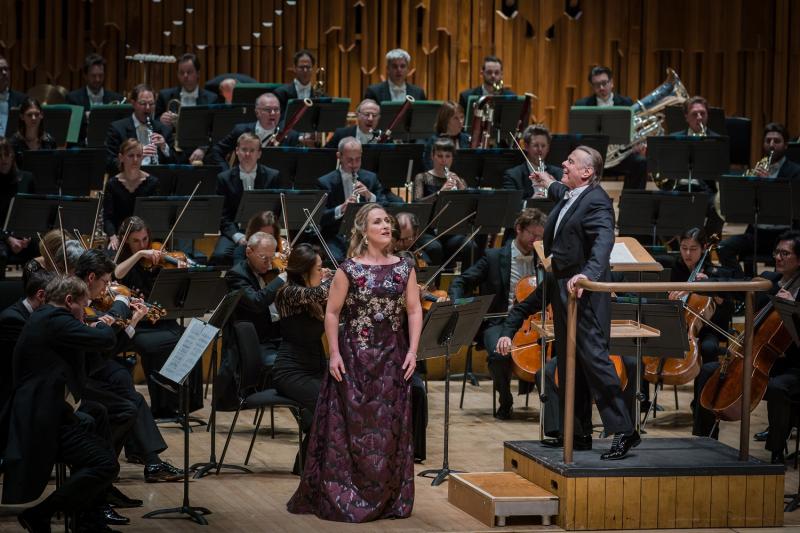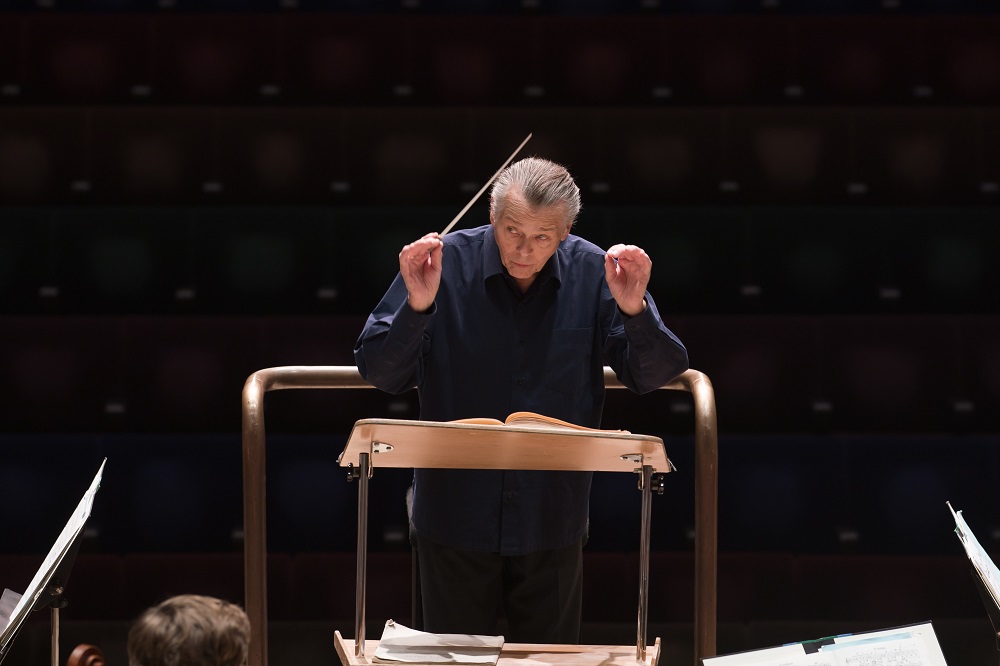Damrau, BRSO, Jansons, Barbican review - broad and passionate Strauss | reviews, news & interviews
Damrau, BRSO, Jansons, Barbican review - broad and passionate Strauss
Damrau, BRSO, Jansons, Barbican review - broad and passionate Strauss
Warm and richly coloured performances of 'Ein Heldenleben' and the Four Last Songs

There is no doubting Diana Damrau’s star power. She is not a demonstrative performer, and her voice is small, but the sheer character of her tone, and the passion she invests, make every line special.
All of the Strauss on this programme – the Four Last Songs and Ein Heldenleben – was given in broad and generously shaped readings. Damrau supports her tone beautifully, allowing Jansons to stretch out phrase endings, knowing Damrau will always have something in reserve. Though a native German speaker, she has little interest in projecting the text – colour, phrasing and timbral nuance all take precedence. The Bavarian Radio Symphony is exactly the kind of orchestra that Strauss had in mind: The bottom-up string sound was ideal for “Beim Schlafengehen”, and the rich, characterful woodwind tone made every solo a delight. The first violins had a shaky moment in the divisi passage of “September”, but leader Radoslaw Szulc redeemed all with a beautifully rendered solo in “Beim Schlafengehen”, his tone broad and complex, his rubato just the right side of indulgent. An excellent horn solo, too, from Eric Terwilliger in “September” – rich, warm, beautifully supported.  Mariss Jansons (pictured above in rehearsal for the Barbican concert) is one of the greats among living conductors, and his recording catalogue is second to none. But I’ve been unimpressed by his recent live appearances; his performances have seemed professional but uninspired. Fortunately, Strauss finds him on top form. It is music that needs a steady hand and careful shaping, but it also needs passion and breadth, all of which Jansons delivers. Ein Heldenleben, Strauss’s tone poem about the travails of his own career, is a messy and sprawling affair. But it is a favourite with orchestras that can play it, as it shows off their strengths. That was certainly the case here with the BRSO, and, as with the songs, a healthy dose of Bavarian colour invigorated proceedings.
Mariss Jansons (pictured above in rehearsal for the Barbican concert) is one of the greats among living conductors, and his recording catalogue is second to none. But I’ve been unimpressed by his recent live appearances; his performances have seemed professional but uninspired. Fortunately, Strauss finds him on top form. It is music that needs a steady hand and careful shaping, but it also needs passion and breadth, all of which Jansons delivers. Ein Heldenleben, Strauss’s tone poem about the travails of his own career, is a messy and sprawling affair. But it is a favourite with orchestras that can play it, as it shows off their strengths. That was certainly the case here with the BRSO, and, as with the songs, a healthy dose of Bavarian colour invigorated proceedings.
The lower strings shone at the opening, with particularly impressive agility and ensemble. Strauss represents the critics with spiky woodwind solos, another opportunity to hear the rich flute and oboe tone, just as characterful, even in this staccato music. Narrow-bore trumpets dominated the battlefield scene, not as loud as their British counterparts, but just as imposing. And best of all, Szulc and Terwilliger, again delivering handsomely, Szulc more nimble now in his portrayal of Strauss’s wife, Pauline, and Terwilliger bringing a sense of noble serenity to the “Retirement and Fulfilment” coda.
Despite his age, Jansons remains impressively dynamic and engaged. In lesser hands, Strauss’s scene changes can seem clumsy, but Jansons knows how to bring a sense of symphonic coherency – perhaps even despite the music. As with the songs, the sheer breadth of his reading was particularly impressive; everything was about the bigger picture. And, although as disciplined as Damrau when it comes to emotion, he knows how to milk the set pieces, the floating string passages, the reflective interludes and, best of all, the noble, consummate ending, crowned with that elegant horn solo. Gorgeous, just gorgeous.
The future of Arts Journalism
You can stop theartsdesk.com closing!
We urgently need financing to survive. Our fundraising drive has thus far raised £49,000 but we need to reach £100,000 or we will be forced to close. Please contribute here: https://gofund.me/c3f6033d
And if you can forward this information to anyone who might assist, we’d be grateful.

Subscribe to theartsdesk.com
Thank you for continuing to read our work on theartsdesk.com. For unlimited access to every article in its entirety, including our archive of more than 15,000 pieces, we're asking for £5 per month or £40 per year. We feel it's a very good deal, and hope you do too.
To take a subscription now simply click here.
And if you're looking for that extra gift for a friend or family member, why not treat them to a theartsdesk.com gift subscription?
more Classical music
 BBC Proms: Jansen, Royal Concertgebouw Orchestra, Mäkelä review - confirming a phenomenon
Second Prom of a great orchestra and chief conductor in waiting never puts a foot wrong
BBC Proms: Jansen, Royal Concertgebouw Orchestra, Mäkelä review - confirming a phenomenon
Second Prom of a great orchestra and chief conductor in waiting never puts a foot wrong
 BBC Proms: Royal Concertgebouw Orchestra, Mäkelä review - defiantly introverted Mahler 5 gives food for thought
Chief Conductor in Waiting has supple, nuanced chemistry with a great orchestra
BBC Proms: Royal Concertgebouw Orchestra, Mäkelä review - defiantly introverted Mahler 5 gives food for thought
Chief Conductor in Waiting has supple, nuanced chemistry with a great orchestra
 Dunedin Consort, Butt / D’Angelo, Muñoz, Edinburgh International Festival 2025 review - tedious Handel, directionless song recital
Ho-hum 'comic' cantata, and a song recital needing more than a beautiful voice
Dunedin Consort, Butt / D’Angelo, Muñoz, Edinburgh International Festival 2025 review - tedious Handel, directionless song recital
Ho-hum 'comic' cantata, and a song recital needing more than a beautiful voice
 Classical CDs: Dungeons, microtones and psychic distress
This year's big anniversary celebrated with a pair of boxes, plus clarinets, pianos and sacred music
Classical CDs: Dungeons, microtones and psychic distress
This year's big anniversary celebrated with a pair of boxes, plus clarinets, pianos and sacred music
 BBC Proms: Liu, Philharmonia, Rouvali review - fine-tuned Tchaikovsky epic
Sounds perfectly finessed in a colourful cornucopia
BBC Proms: Liu, Philharmonia, Rouvali review - fine-tuned Tchaikovsky epic
Sounds perfectly finessed in a colourful cornucopia
 BBC Proms: Suor Angelica, LSO, Pappano review - earthly passion, heavenly grief
A Sister to remember blesses Puccini's convent tragedy
BBC Proms: Suor Angelica, LSO, Pappano review - earthly passion, heavenly grief
A Sister to remember blesses Puccini's convent tragedy
 BBC Proms: A Mass of Life, BBCSO, Elder review - a subtle guide to Delius's Nietzschean masterpiece
Mark Elder held back from blasting the audience with a wall of sound
BBC Proms: A Mass of Life, BBCSO, Elder review - a subtle guide to Delius's Nietzschean masterpiece
Mark Elder held back from blasting the audience with a wall of sound
 BBC Proms: Le Concert Spirituel, Niquet review - super-sized polyphonic rarities
Monumental works don't quite make for monumental sounds in the Royal Albert Hall
BBC Proms: Le Concert Spirituel, Niquet review - super-sized polyphonic rarities
Monumental works don't quite make for monumental sounds in the Royal Albert Hall
 Frang, Romaniw, Liverman, LSO, Pappano, Edinburgh International Festival 2025 review - sunlight, salt spray, Sea Symphony
Full force of the midday sea in the Usher Hall, thanks to the best captain at the helm
Frang, Romaniw, Liverman, LSO, Pappano, Edinburgh International Festival 2025 review - sunlight, salt spray, Sea Symphony
Full force of the midday sea in the Usher Hall, thanks to the best captain at the helm
 Elschenbroich, Grynyuk / Fibonacci Quartet, Edinburgh International Festival 2025 review - mahogany Brahms and explosive Janáček
String partnerships demonstrate brilliant listening as well as first rate playing
Elschenbroich, Grynyuk / Fibonacci Quartet, Edinburgh International Festival 2025 review - mahogany Brahms and explosive Janáček
String partnerships demonstrate brilliant listening as well as first rate playing
 BBC Proms: Akhmetshina, LPO, Gardner review - liquid luxuries
First-class service on an ocean-going programme
BBC Proms: Akhmetshina, LPO, Gardner review - liquid luxuries
First-class service on an ocean-going programme

Add comment